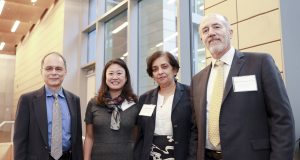
UCLA Samueli hosted the first joint workshop last December that focused on healthy aging, including research in brain-computer interfaces and the molecular mechanisms of aging and precision medicine.

among the world’s best young universities for five consecutive years.
This year marks the 20th anniversary of Lim’s first graduation from UCLA. She graduated with a bachelor’s in chemical engineering with a bioengineering option in 2000 and a doctorate in biomedical engineering in 2005 from UCLA Samueli.
In March 2020, a premiere magazine in Singapore profiled her as one of Asia’s impactful women in STEM, citing her leadership in Women@NTU Initiatives to promote women in science and engineering. Lim also organized the first all-female hackathon in collaboration with Xilinx, a semiconductor manufacturing company, and Garage@EEE, which is NTU Singapore’s student-run makerspace.
We followed up with her to learn more about the partnership and any advice she may have for Bruin engineers.
Q: What is your role in the ongoing partnership between UCOP and NTU Singapore?
A: In my academic capacity at NTU Singapore, I took on the opportunity to reach out to UCOP and explore opportunities to collaborate, following UCOP president Janet Napolitano’s visit. I spearheaded the initiative and worked with the UCOP and UCLA teams to co-organize the first joint workshop held at UCLA.
UCOP’s then vice president of research, Art Ellis, and I agreed that a workshop could bring together engineers and biological, medical, and social scientists from UC campuses and NTU to address important societal issues. With input from NTU’s then dean of the Graduate College, K. Jimmy Hsia, healthy aging was identified as a national interest for both Singapore and the U.S. I then worked with Hal Monbouquette, associate dean for research at UCLA Samueli, to organize the workshop.
Q: What was the outcome of the Healthy Aging workshop?
A: The discussions highlighted the need for convergence science, including interdisciplinary approaches and multi-agency support, in addressing the global challenge of healthy aging.
Based on the workshop, UC-NTU teams were formed and quite a few submitted grant applications for the Healthy Longevity Global Competition founded by the U.S. National Academy of Medicine, which has partnered with the Singapore National Research Foundation and Ministry of Health, among others.
We are also putting together a whitepaper that will summarize the salient points of the workshop and possible next steps.
Q: What are the team’s future plans?
A: We are planning to hold a reciprocal workshop at NTU sometime next year when travel bans are lifted. In the meantime, we will develop a virtual platform to foster the existing collaborations, as well as develop new ones.
Q: Are there any unexpected opportunities or challenges of the partnership?
A: Bicontinental collaborations are always challenging and require a lot of resources. However, this also presents an opportunity to rethink how we collaborate in research and education. It gives us the impetus to leverage virtual platforms, further enhanced by COVID-19, in ways that have not been done before.
Q: Any fond memories of UCLA Samueli?
A: Too many to count! I pretty much grew up on south campus from 1997 to 2004, with occasional visits to north campus. One thing I will never forget is getting a phone call on the walkway between Kerckhoff and Math Sciences during my junior year. The caller asked me if I was still interested in interning at a chemical engineering lab. I had been trying to get into that lab for three quarters, but every time I received a “Sorry, my lab is full,” response. So, when that phone call came, I said “Yes” without thinking.
That was the first time I was exposed to bioengineering research. Based on my undergraduate research experience, my advisor encouraged me to pursue a Ph.D., something I had never thought about. One thing led to another, and now I am a professor who engineers biological solutions to health and environmental problems. This is all thanks to the exposure and mentorship I received during my time at UCLA which started with that single phone call.
UCLA is where I was cultivated to became who I am today. You may be wondering who the caller was — it was Professor Hal Monbouquette, who I organized the workshop with!
Q: Any advice for Bruin Engineers?
A: Learn well, explore! And don’t be afraid to stretch your comfort zone. You’ll never know what you can achieve until you try.
I was a reserved person because that was how I was brought up. At UCLA, I was challenged. I realized that I had to open up and stretch myself. I learned leadership skills when I agreed to be the president of the UCLA Biomedical Engineering Society’s student chapter. Those skills have served me well throughout my career and I’m glad that UCLA gave me a safe place to learn.
UCLA can be an overwhelming place but one can always find a niche there. Take time to find the connections and cultivate them. I am lucky to have been mentored by wonderful professors, and to have received a world-class education on a beautiful campus.
